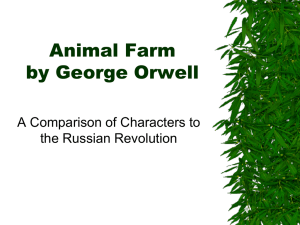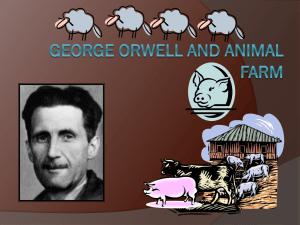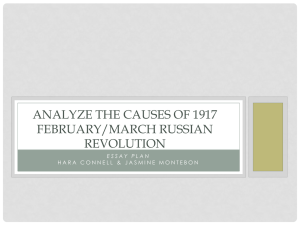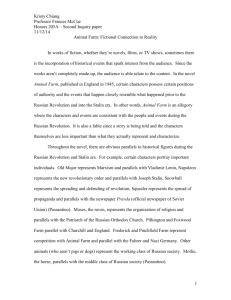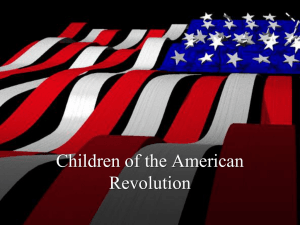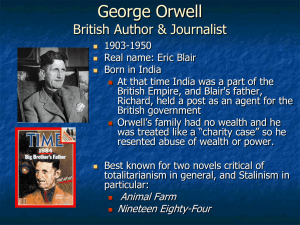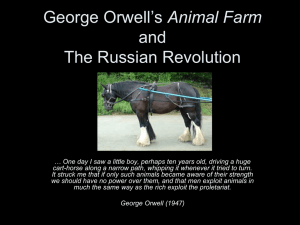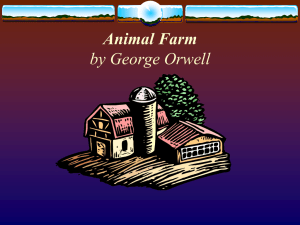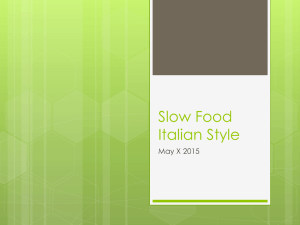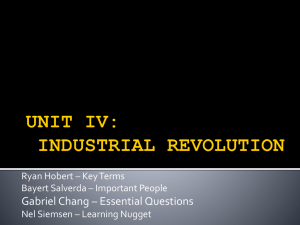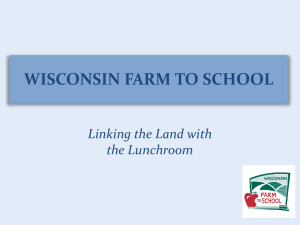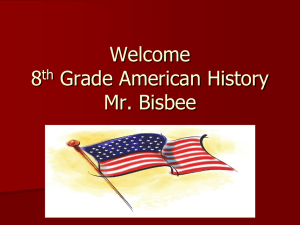Animal Farm Notes
advertisement
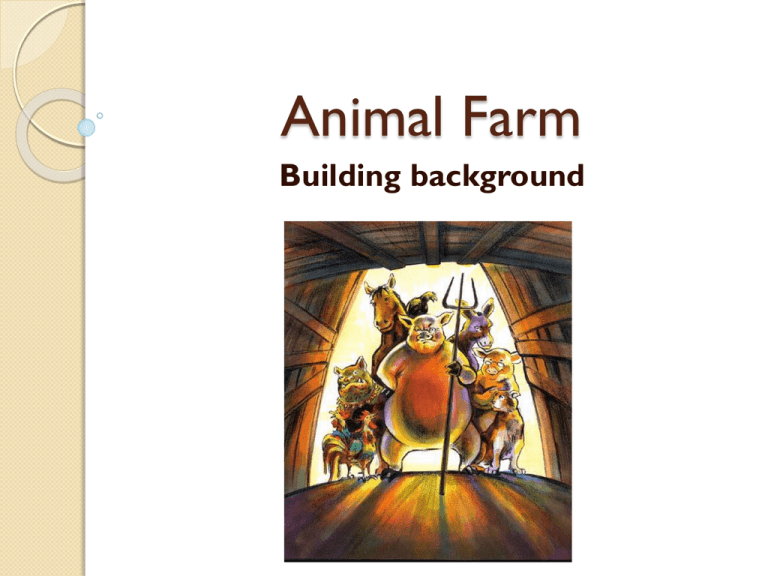
Animal Farm Building background What is Animal Farm? A masterpiece of political satire, Animal Farm is a tale of oppressed individuals who long for freedom but ultimately are corrupted by assuming the very power that had originally oppressed them. The story traces the deplorable conditions of mistreated animals who can speak and who exhibit many human characteristics. After extreme negligence by their owner, the animals revolt and expel Mr. Jones and his wife from the farm. The tale of the society the animals form into a totalitarian regime is generally viewed as Orwell's critique of the communist system in the former Soviet Union. Interesting Fact: Orwell initially struggled to find a publisher for Animal Farm. Significance Today But why – now that Soviet Communism has fallen and the Cold War is over –does Animal Farm deserve our attention? ◦ The answer lies in the power of allegory. Allegorical fables, because they require us to make comparisons and connections, can be meaningful to any reader in any historical period. The story of Animal Farm will always have lessons to teach us about the ways that people abuse power and manipulate others. Orwell's chilling story of the betrayal of idealism through tyranny and corruption is as fresh and relevant today as when it was first published in 1945. Fables What does FABLE mean?... ◦ The fable is one of the oldest literary forms ◦ A fable is usually short, written in either verse or prose, and conveys a clear moral or message. ◦ The earliest fables still preserved date back to 6th Century Greece B.C. The author of these fables, Aesop, used animal characters to stand for human "types." For example, a fox character might embody the human characteristics of cunning and cleverness. Though Aesop's animal fables were supposedly about animals, they were really instructional tales about human emotions and human behavior. Allegorical Fables What does ALLEGORY mean?... ◦ Most fables have two levels of meaning. On the surface, the fable is about animals. But on a second level, the animals stand for types of people or ideas. The way the animals interact and the way the plot unfolds says something about the nature of people or the value of ideas. ◦ Any type of fiction that has multiple levels of meaning in this way is called an allegory. Satire ◦ In a satire, the writer attacks a serious issue by presenting it in a ridiculous light or otherwise poking fun at it. Orwell uses satire to expose what he saw as the myth of Soviet socialism. Thus, the novel tells a story that people of all ages can understand, but it also tells us a second story— that of the real-life revolution. Soviet Coat of Arms 1984 The novel, published in 1949, takes place in 1984 and presents an imaginary future where a totalitarian state controls every aspect of life, even people's thoughts. The state is called Oceania and is ruled by a group known as the Party; its leader and dictator is Big Brother. Why did Orwell choose to use Animals? In explaining how he came to write Animal Farm, Orwell says he once saw a little boy whipping a horse and later he wrote, ◦ “It struck me that if only such animals became aware of their strength we should have no power over them, and that men exploit animals in much the same way as the rich exploit the [worker].” Symbolism Symbols are objects, characters, figures, and colors used to represent abstract ideas or concepts. Example: ◦ The dove is an animal, ◦ but it also stands for peace. Quick Practice: What do the following commonly stand for? Death, Evil, Sadness Luck Wisdom Symbolism in literature A symbol in literature often represents an important issue or is significant to the meaning of the story. ◦ To enhance the meaning of the story ◦ Add to the mood of a story ◦ Can relate to theme Example: ◦ A storm at a critical point in a story may represent a conflict or height of emotion. ◦ A transition from day to night, or spring to winter, could symbolize a move from good to evil or hope to despair. Symbolism in literature There are many ways to recognize symbols in literature. ◦ The frequency ◦ Amount of detail ◦ Commonly Used: Colors Animals Nature Religious Symbolism - Animal Farm Animal Farm, known at the beginning and the end of the novel as the Manor Farm, symbolizes human society, be it capitalist, socialist, fascist, or communist. *Can you find the definitions to these 4 terms in your Social Studies textbook? It possesses the internal structure of a nation: -a government (the pigs) -a police force or army (the dogs) -a working class (the other animals) Its location is amid a number of hostile neighboring farms supports its symbolism as a political entity with diplomatic concerns. Symbolism - The Barn The barn at Animal Farm represents the collective memory of a modern nation. The many scenes in which the ruling-class pigs alter the principles of Animalism and in which the working-class animals puzzle over but accept these changes represent the way an institution in power can revise a community’s concept of history to bolster its control. Symbolism - The Windmill The great windmill symbolizes the pigs’ manipulation of the other animals for their own gain. Despite the immediacy of the need for food and warmth, the pigs exploit Boxer and the other common animals by making them undertake backbreaking labor to build the windmill, which will ultimately earn the pigs more money and thus increase their power THEME Your focus will be on the symbolism presented throughout the text and how it connects to Orwell’s overall theme. Symbolism – Orwell’s use of animals to reflect certain human-like characteristics (connection to humanity) Theme – Orwell’s overall theme is man's inhumanity to man Specific Examples that Display Theme Throughout the Novel The Inevitability of Totalitarianism Those who seek freedom from oppression will inevitably fall to repeat that which oppressed them. Intelligence and Education as Tools of Oppression Those in a position of power will use intelligence and education as tools of oppression. Violence,Terror & Propaganda and Duplicity Those in power will use propaganda, violence, and terror as a means of control in order to ensure their position of power. Apathy and Acceptance The oppressed will fall into a system of apathy and acceptance of their way of life. You will be responsible for identifying these themes while you read. You will need to be annotating. Jigsaw Activity Groups will spend one class period researching topic/s and one class period presenting on their assigned topic: Lenin- Molly, Spencer, Brandon (focus the research on that person in regards to the Russian Revolution) Stalin – Liam, Sarah, Kathleen (focus the research on that person in regards to the Russian Revolution) Trotsky – Riley, Kira, Amber, Mathew (focus the research on that person in regards to the Russian Revolution) Tsar Nicholas II – Andy, Jack, Sydnie, Logan (focus the research on that person in regards to the Russian Revolution) Marx– Mikey, Megan, Kyle, Jason (focus the research on that person in regards to the Russian Revolution) Fascism – Anushka, Tara, Hannah Communism – Lauren, Jake Totalitarianism – Melanie, Elise Capitalism – Mikayla, Noelle Socialism – Jimmy, TJ How to plan your presentation… If you are researching a person, you should be focusing on a mini-biography of that person’s relevance to the Russian Revolution. If you are doing a type of government, you should be giving a brief description of the basic ideals of that government, and a brief history of that system of government’s use around the world during the time of the Russian Revolution. Socratic Seminar Practice “Whip Around” Rules: ◦ Read the statement carefully. ◦ Determine your opinion. ◦ We will go around and share whether we AGREE or DISAGREE. You must pick a position. No explanation is permitted at this point. ◦ After we have all completed the whip around, we will elaborate on the discussion statement by adding onto the statement with an open-ended question. Remember how to address your classmates when you agree/disagree with their ideas? Do not raise your hand. I will not call on you. MOCK SOCRATIC SEMINAR WHIP AROUND: Determine whether you agree or disagree. People take their freedoms for granted. Animal Farm Novel Study – Pre Reading Socratic Seminar Questions: 1. Which is the more important value, freedom or equality? i. ii. How would you define freedom and equality? Should the government use violence to enforce these values? Two minutes to think, pair, share.Then we will discuss together! This is an open-ended question. Socratic Seminar Questions: 1. What freedoms do we take for granted in the United States? Do you think we have too much freedom? Support your answer. This is an open-ended question. Socratic Seminar Questions: 1. What freedoms do you think we don’t need in the U.S.? Which one would you be willing to give up if you were forced to make that choice? Support your answer. This is an open-ended question. Comparing Characters Now that we have been introduced to some of the main characters lets make some comparisons to the historical figures you presented about last week…. Napoleon = Joseph Stalin Napoleon ◦ Boar who leads the rebellion against Farmer Jones ◦ After the rebellion’s success, he systematically begins to control all aspects of the farm until he is an undisputed tyrant. Joseph Stain ◦ The communist dictator of the Soviet Union from 1922-1953 who killed all who opposed him. ◦ He loved power and used the KGB (secret police) to enforce his ruthless, corrupt antics. Farmer Jones = Czar Nicholas II Farmer Jones Czar Nicholas II ◦ The irresponsible owner of the farm ◦ Weak Russian leader during the early 1900s ◦ Lets his animals starve and beats them with a whip ◦ Often cruel and brutal to his subjects ◦ Sometimes shows random kindness ◦ Displays isolated kindess Snowball = Leon Trotsky Snowball ◦ Boar who becomes one of the rebellion’s most valuable leaders. ◦ After drawing complicated plans for the construction of a windmill, he is chased off of the farm forever by Napoleon’s dogs and thereafter used as a scapegoat for the animals’ troubles. Leon Trotsky ◦ A pure communist leader who was influenced by the teachings of Karl Marx. ◦ He wanted to improve life for people in Russia, but was driven away by Lenin’s KGB. Old Major = Karl Marx Old Major ◦ An old boar whose speech about the evils perpetrated by humans rouses the animals into rebelling. ◦ His philosophy concerning the tyranny of Man is named Animalism. ◦ He teaches the animals the song “Beasts of England” ◦ Dies before revolution Karl Marx ◦ The inventor of communism ◦ Wants to unite the working class to overthrow the government. ◦ Dies before the Russian Revolution Animalism = Communism Animalism ◦ ◦ ◦ ◦ ◦ Taught my Old Major No rich, but no poor Better life for workers All animals are equal Everyone owns the farm Communism ◦ Invented by Karl Marx ◦ All people are equal ◦ Government owns everything ◦ People own the government Animal Farm Revolution = Russian Revolution Animal Farm Revolution ◦ Was supposed to make life better for all, but . . . Life was worse at the end. The leaders became the same as, or worse than the other farmers (humans) they rebelled against. Russian Revolution ◦ Was supposed to fix the problems created by the Czar, but . . . Life was even worse after the revolution. Stalin made the Czar look like a nice guy.
